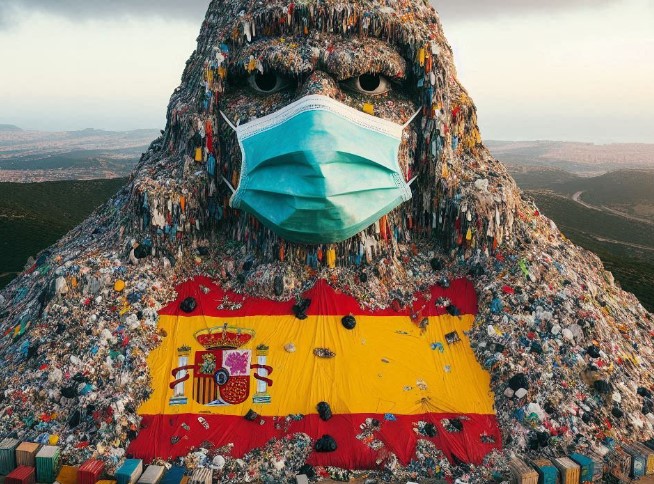The Spanish Ministry of Health continues to hold a significant stock of protective masks acquired during the COVID-19 pandemic. Recent data, provided by the Ministry via the Transparency Portal, reveals an alarming figure: Of the original 112,347,110 masks stored in its facilities, a staggering 97,958,110 units have expired. This accounts for a shocking 87.17% of the total stock and represents not only a considerable health risk but also an immense economic waste.
Of the masks still in storage, 18,442,990 are FFP2 category, 1,639,520 are FFP3, and 92,264,600 are surgical masks. A large portion of these are no longer usable: 17,867,990 FFP2 masks have expired, while only 575,000 units remain valid. The situation is even more drastic for FFP3 masks: Not a single one of the original 1,639,520 masks is still usable – all have expired. The situation with surgical masks is also bleak: 78,450,600 units are obsolete, with only 13,814,000 still valid. Thus, only 14,389,000 of the stored protectors are still functional.
Millions of Euros Lost: The Economic Value of the Surplus
The economic value of these gigantic mask inventories, still languishing in the Ministry of Health’s warehouses, amounts to a substantial 105,306,655 Euros, according to INGESA (Social Security Management Entity). This sum is composed as follows: FFP2 masks account for 59,329,284 Euros, FFP3 masks for 10,066,653 Euros, and surgical masks for 35,910,718 Euros. Unit prices were also considerable: an FFP2 mask cost an average of 3.22 Euros, an FFP3 mask 6.14 Euros, and a surgical mask 0.38 Euros. The consequence of this waste is severe: the economic value of the expired face masks still held by the Ministry of Health (without having been used) amounts to an incredible 97,374,576 Euros.
Gloves and Hydroalcoholic Gel: A Success Story in the Shadow of the Mask Misery
In contrast to the mask waste, the Ministry states that no stocks of gloves and hydroalcoholic gel acquired during the coronavirus crisis remain in facilities owned or commissioned by the Ministry. All inventories of these materials have either been used, distributed, or disposed of. A glimmer of hope amidst the extensive mask problem.
COVID-19 Pandemic: A Time of Crisis and Controversial Emergency Contracts
The COVID-19 pandemic marked an unprecedented global health crisis. Governments worldwide were forced to take drastic measures to curb the spread of the virus and strengthen their healthcare systems. This included the procurement of vast quantities of personal protective equipment.
The Ministry of Health, then under the leadership of Salvador Illa, concluded numerous emergency contracts during this period for the procurement of medical supplies. A large portion of these contracts were awarded directly and without public tender due to the health emergency and the acute shortage of suppliers in the first months of the crisis. A particularly egregious example is the so-called Travis case, the largest mask contract of the pandemic. Here, 361 million Euros were awarded to two Chinese companies, HongKong Travis Asia Limited and Hangzhou Ruining Trading. The material often arrived late, was significantly overpriced, and in many cases proved to be defective or unusable.
The Koldo Case: Intercepted Conversations and Possible Involvement
In the context of the Travis case, intercepted recordings of Koldo García to Santos Cerdán by the Central Operational Unit (UCO) of the Guardia Civil, as part of the Koldo-Cerdán-Ábalos case, have emerged. These could be crucial, as both interlocutors express concerns about being intercepted and mention using the Signal app to avoid this. In these recordings, Koldo claims that “Salvador Illa talks a lot with Chili” – a possible codename for Xi Li (Xiaojuan Li), a representative of the two Chinese companies involved. Investigations into this sensitive case are ongoing.




